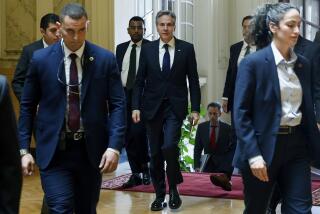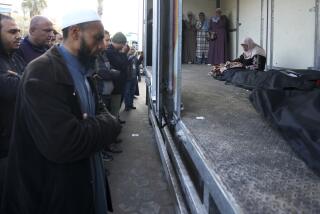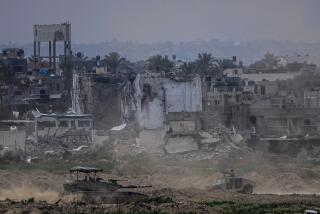Syrian rebels must give up arms before talks, Assad says
BEIRUT — Syrian rebels must give up their weapons before the government will agree to hold peace talks with them, Syrian President Bashar Assad said in a newspaper interview published Sunday.
“We are willing to negotiate with anyone, including militants, who surrender their arms,” Assad told Britain’s Sunday Times in a rare interview with a western publication. “We can engage in dialogue with the opposition, but we cannot engage in dialogue with terrorists. We fight terrorism.”
Assad’s government routinely refers to the Syrian rebels as terrorists.
The president’s stance would seem to dim the already cloudy prospects for peace talks in a conflict that has been going on for almost two years and has cost tens of thousands of lives.
There seems little likelihood that Syria’s disparate rebel groups, who have made major military advances, would agree to lay down their arms for talks with their archenemy.
The principal opposition coalition has already said it will enter into negotiations only if Assad’s departure is guaranteed. The Syrian government has rejected such a condition.
Syrian Foreign Minister Walid Moallem indicated during visits last week to Russia and Iran — Syria’s two major international allies — that Damascus was prepared to sit down for peace talks with armed insurgents. His comments marked the first time that a high-ranking Syrian government official had indicated that the regime was willing to talk directly with the armed opposition.
However, Woallem did not spell out whether rebels would first have to put down their weapons. The Syrian president has now clarified that point.
“As with any sovereign state, we will not negotiate with terrorists,” Assad said, according to a transcript of the Sunday Times interview posted online by Syria’s state-run news agency.
In the hour-long interview, as in many previous statements, the Syrian president made it clear that he has no intention of stepping down in the face of what he views as a foreign conspiracy hatched by the West and its allies in Turkey, Saudi Arabia and Qatar.
“Only [the] Syrian people can tell the president, ‘Stay or leave, come or go,’ ” Assad, speaking in fluent English, told the newspaper in the interview in Damascus. “I am just saying this clearly in order not to waste the time of others to know where to focus.”
Assad, who succeeded his late father, Hafez Assad, as Syria’s president in 2000, described as “very lethal” what U.S. Secretary of State John F. Kerry has called “non-lethal” aid destined for Syrian dissident groups. Last week, Kerry announced that Washington has agreed to provide tens of millions of dollars in additional assistance, including food and medical supplies for rebel fighters, but excluding weapons.
“The intelligence, communication and financial assistance being provided is very lethal,” said Assad, who cited the Sept. 11, 2001 attacks on the United States as an illustration of how “non-lethal” methods could be deadly. “The events of 11th of September were not committed by lethal aids. It was the application of non-lethal technology and training which caused the atrocities.”
As in previous public statements, Assad characterized the rebellion in his country as an attack by al Qaeda militants and other extremists on a nation he labeled “the last bastion of secularism in the region.” He added: “We should be worrying about the majority of moderate Syrians who, if we do not fight this extremism, could become the minority — at which point Syria will cease to exist.”
The Syrian president scoffed at western efforts to vet rebel factions and funnel support to “moderate” fighters.
“The British government wants to send military aid to moderate groups in Syria, knowing all too well that such moderate groups do not exist in Syria,” said Assad, who accused Britain’s leaders of employing “shallow and immature” rhetoric and of being steeped in a “tradition of bullying and hegemony.”
British Foreign Secretary William Hague, who has spoken of bolstering aid to the Syrian rebels, told the BBC that Assad’s latest comments were “delusional.”
Inside Syria, opposition activists reported Sunday that rebels had taken almost complete control of a strategic police academy outside the northern city of Aleppo after more than a week of fierce battles.
Unverified video seemed to show insurgents swarming into the sprawling complex. More than 200 soldiers and rebels were killed in the latest series of clashes at the academy, according to the Syria Observatory for Human Rights, a pro-opposition group based in Britain.
ALSO:
Attack on Pakistani Shiites kills at least 30
U.S. to provide $60 million in aid to Syrian rebels
Russia charges that U.S. aid helps Syrian ‘extremists’
More to Read
Start your day right
Sign up for Essential California for news, features and recommendations from the L.A. Times and beyond in your inbox six days a week.
You may occasionally receive promotional content from the Los Angeles Times.






